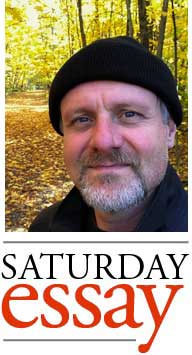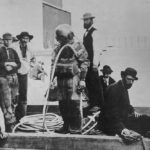The Public Complicity Trick
 One of the means of control my father used in his abuse (of my mother, my sisters, and me) was what I have come to think of as the “Public Complicity Trick.”
One of the means of control my father used in his abuse (of my mother, my sisters, and me) was what I have come to think of as the “Public Complicity Trick.”
I’m going to describe this trick from my childhood, though I am a man now and it happened decades ago, because I need to speak about how I’ve seen what seems to be a similar effort recently from a man who I once thought of as a friend. This person chose to call into the podcast of a prominent national celebrity to enter the public sphere of discussion about cancel culture. I won’t repeat the details of his call; Allison Morse has outlined that story.
When I was young, my family would sometimes be out somewhere in the community, and my father would launch into one of his Big Lies. He would tell a friend about some great thing he had accomplished in his younger days—being a champion boxer in the military; or he would tell the head of the small-town Nebraska volunteer fire department that he had saved three people from a fire while serving as a volunteer during one of our cyclic moves between Texas (where he was from) and Nebraska (where my mother was from); or he would tell some new acquaintance from the evangelical church about a vision he claimed had helped him kick drugs and booze. (That brings back my memory of finding his jar of black capsules of some drug—not a prescription—in the kitchen cabinet when I was about 10. I carefully opened each capsule, dumped the powder down the drain, and closed the empty capsules to return them to the jar.)
The Lies were, of course, bad enough themselves, but the moment that froze me was the one I always knew was coming. After he told his lie, he would turn to my mother, my sister, or to me, and say something like, “Ain’t that right, honey; ain’t that right, girl; ain’t that right, son?” And my mother, my sister, or I would offer our meek, “yes, that’s right,” or our nod of the head, and the Public Complicity Trick would have its moment of mediocre magical reveal.
I’m sure the people he was talking to never believed my father’s Lies, but that wasn’t the point—the Public Complicity Trick existed to exert control over us—the people who lived under the shadow of his abuse. “See,” he was saying to us, “I control the narrative of life. You are only supporting characters in my version of reality.”
It was important to him that he perform this trick in a public space, take advantage of a human tendency toward being polite in public, social settings. The trick repeats the structure of the manipulator’s abuse: both violations of trust that people are who they say they are.
Abusers Claiming the Terms of Telling the Story Repeats Itself Too Often
I heard the trick at play again recently, when a convicted sex offender I once trusted as a friend spoke on a podcast about the “path back into society for someone who has offended,” comparing himself favorably to famous offenders who denied their guilt instead of taking responsibility. But the fact that he chose to enter some form of public discussion to claim a right to frame the story of how men should and should not be held accountable for the damage they cause speaks to the same complicity trick my father used. “Look,” this action seems to say, “I will tell you how the story unfolds. I will control the narrative.”
Men who have harmed young girls, who have broken the trust of their community, who have permanently and hurtfully affected lives do not get to decide whether, when, or how a community forgives them.
I refuse to let the pain caused by abuse of power get swept away by the Public Complicity Trick. I know too well the legacies of suffering that an abuser imposes on the people he targets.
I was fooled into that same kind of complicity by a man I thought was my friend. I continue to reckon with the feelings of anger and shame his abuse and my inability to see it brought forward.
Accountability is Not Something an Abuser Gets to Decide is Finished
I remember sitting in the back row of a courtroom watching this man I had thought of as a friend for years disappear from reality. Like my bandmates and friends, like so many in my community, I had been manipulated by a performance. This man abused his power over someone who was under his duty of care and convinced her, and so many of the rest of us, that he was a safe person. I went to the sentencing to join with others who were there to hold space for the strong young woman who refused to let his crafted fiction continue to cast its shadow on the lives of other girls.
It was a painfully resonant experience, since my childhood had been shaped by a man glib of tongue, smooth of character, someone who used charisma to empower himself as an abuser.
The girl this man abused would grow into a young woman who had to find ways to, if not heal, at least to make uneasy peace with the jagged shards of trauma he has forced into her life. He would spend less time in jail than she would in therapy. He stole her first years of growing awareness of being a human adult with her own agency and power.
And I did not know. How could I not know? I’d seen this kind of behavior before, watched it dissolve the well-being of my own sisters, my mother, myself. How could I have been so naive to trust he was who he said he was—someone who claimed to care about the well-being of young people, someone who claimed to be a feminist, someone who said he was making a life of community care?
A year or so after he served some of his year-long sentence, this man approached me at a public event. In this setting, he made overtures that said he wanted to resume a friendship, and I remember clearly that he said, “I am a safe person. I want you to know that.” I acknowledged that he must be having a hard time putting a life back together, but I made it clear I would not be open to further contact. “I’m not going to be able to be part of your healing process here,” I said.
He walked away; there was no successful resolution to the Public Complicity Trick.
A few years later, I was in a long line at a music venue with a friend, another man who had been blind to that past abuse until it was exposed by the brave young woman who filed charges and saw the case through. This friend and I had had some hard cries together over our earlier unknowing stance that had allowed this offense to be unchecked until a young woman who had suffered from his abuse took on the burden of being the one to demand a reckoning by the legal system that so often fails women who speak.
Despite my refusal to consent several years earlier, this man approached me again. There were a lot of people in that line, snaked around a fenced courtyard. I know none of them were specifically watching us, but it felt like a very public arena to be approached. I refused again, and he walked away.
Now, several more years later, I see that this convicted offender has involved an unsuspecting celebrity in the Public Complicity Trick. The celebrity podcaster who chose to play his recorded statement on air, and who gave him the weak tea absolution that she did—she was hoodwinked into the Public Complicity Trick.
The Succinct Message: Don’t Fall for the Public Complicity Trick
And here I arrive at the succinct message of this essay:
A community cannot allow an abuser to control or shape the narrative that belongs to those who have been abused and to the community. As community members we have the responsibility of supporting those who have survived abuse as well as to do better, do more, to listen and believe those who say they have been harmed.
Please don’t let yourself be part of the silence that allows the system of nonaccountability for abusive men to continue. Please don’t be part of the Public Complicity Trick that repeatedly allows this pain to be re-inflicted on people who suffer from abuse.
Recommended Links:
Leave a Comment
Only registered members can post a comment , Login / Register Here














3 Comments
Jim Richardson (aka Lake Superior Aquaman)
about 3 years agoBadCat!
about 3 years agoChris Godsey
about 2 years ago